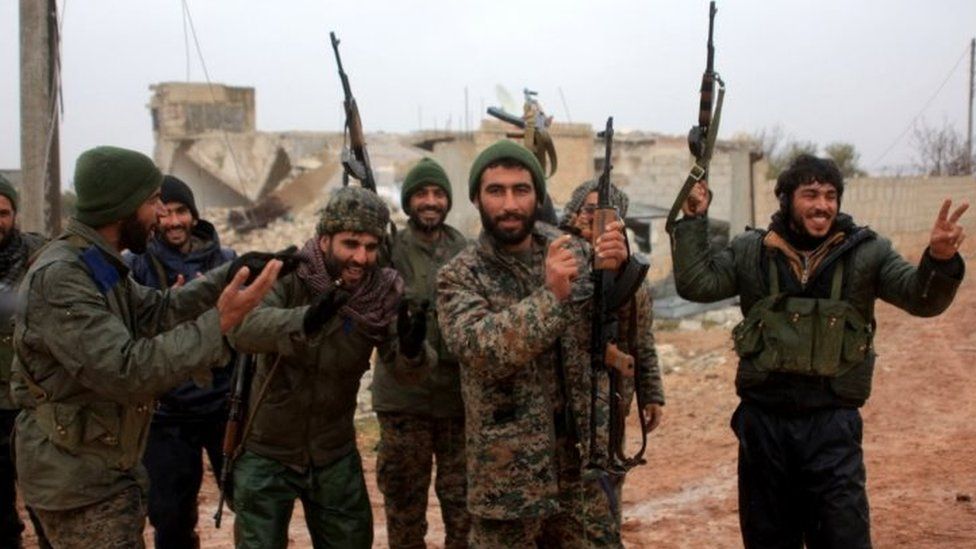Syria war: Tide turns Assad's way amid ceasefire push
- Published

After six months of intensive and concentrated Russian air strikes on pro-US rebels, the scales have tipped dramatically in favour of Syrian President Bashar al-Assad.
Backed by Iranian senior officers and skilled Hezbollah fighters, Mr Assad's forces have gained the upper hand and achieved significant gains in the north, south, Damascus suburbs and now the Aleppo area.
Aleppo, capital of the revolution as the rebels call it, is a strategic prize for the Damascus government.
Its potential encirclement by the Syrian army would deepen the humanitarian crisis and represent a shattering blow to the opposition.
The Syrian army and its allies are getting closer by the day to the Turkish border.
Their game plan is to seal the Turkish and Jordanian border and prevent men and materiel from reaching the rebels, thus effectively delivering a decisive blow.
New phase
Regardless of whether a ceasefire takes hold, any political settlement would reflect the current balance of power which favours Mr Assad.
Russia's agreement in Munich on Thursday to a temporary truce is predicated on a favourable configuration of forces inside Syria.
Freezing the battlefield lines would work in President Assad's favour.
Russian Foreign Minister Sergei Lavrov also reckons that there are many armed factions among the opposition that would not abide by the ceasefire terms.
Far from the beginning of the end, the Syrian conflict has entered a new phase in which the Assad regime has momentum on the battlefield and the negotiating table.
In stark contrast, the opposition is politically and militarily disunited with limited options. There is a disconnect between the opposition's political aspirations and its physical capacity.
The challenge facing the opposition is to bridge this conceptual divide that undermines its negotiating strategy.
Strategic advantage
There are fundamental differences between Moscow and Washington regarding the future of Syria.
In contrast to the Western powers, Russia does not prioritise a radical restructuring of governance in Damascus and solidly backs President Assad.
It is also difficult to see an end to the regional wars by proxy that fuel the fires in Syria. The Saudi-Iranian rivalry is as fierce as ever and Turkey is heavily invested in trying to topple Assad and prevent the Kurds from gaining more influence and autonomy in neighbouring Syria.
More importantly, recent territorial gains by the Assad regime have complicated the quest for political transition in the war-torn country.
Mr Assad has few incentives to compromise, let alone agree to the opposition's expansive demands.
His strategic goal is to either secure a military solution or force the opposition to accept a settlement on his own terms.
Context matters. As the Syrian army advanced towards Aleppo a few days ago, US Secretary of State John Kerry was angry at the Russians for not agreeing to an immediate ceasefire and for enabling Assad to gain a strategic advantage over the rebels.
As they began their meeting in Munich, Mr Kerry and Mr Lavrov sang to different tunes.
While Mr Kerry said he planned to have a "serious conversation" with Mr Lavrov about the urgency to make progress on humanitarian access and a ceasefire, Mr Lavrov was non-committal and threw the ball back into the American court.
Game-changer
At the heart of the American-Russian divide on Syria lie not only clashing interests and worldviews but also different strategic priorities.
In contrast to the US, Russia has made a strategic investment in Syria and its military intervention on the side of Assad last September is a game-changer.
Vladimir Putin now exercises decisive influence in Syria, a powerful bargaining card with America.
Russia has already changed the priorities of UN-backed peace talks in Geneva away from the future of Mr Assad to a ceasefire and constitutional reforms.
Mr Putin's decision to intervene in Syria and shore up Mr Assad with new fighter jets, military advisers and advanced weapons stopped the bleeding of the Syrian army and allowed it to shift from defence to offence.
Russian airpower also restricts the ability of regional powers like Turkey to directly assist the rebels.
Notwithstanding the recent shift on the battlefield, it would be short-sighted and reckless for Mr Assad to declare victory as his Foreign Minister Walid Muallem and his top adviser Bouthaina Shaaban did in the past few days.
Time and again in the past five years, the Assad regime has been guilty of hubris, monstrous miscalculation and underestimation of the complexity of the struggle.
What Mr Assad does not grasp is that the very survival of Syria as a unified state and society is at stake.
Fawaz A Gerges is a professor of International Relations at the London School of Economics, and is the author of the forthcoming ISIS: A History (Princeton University Press).